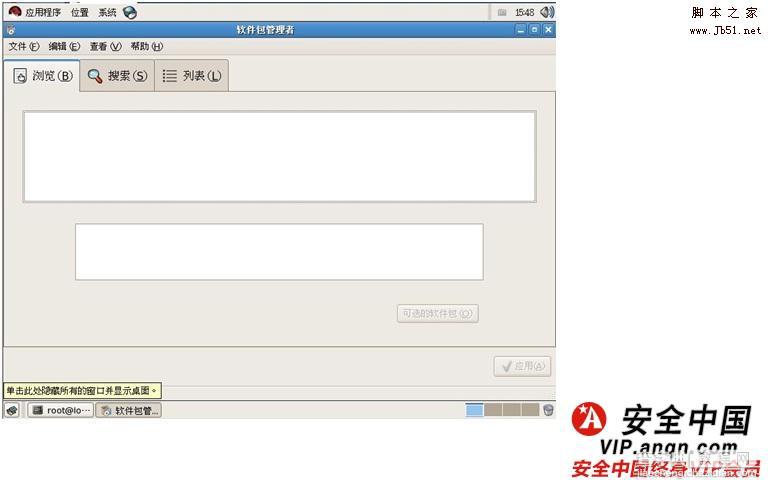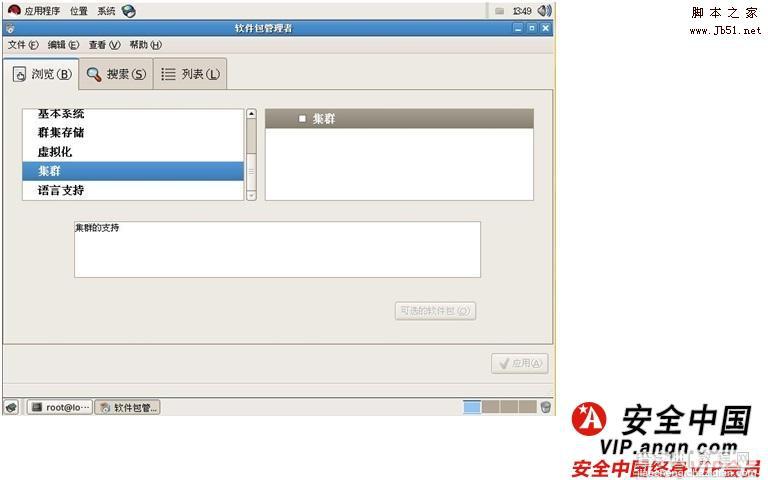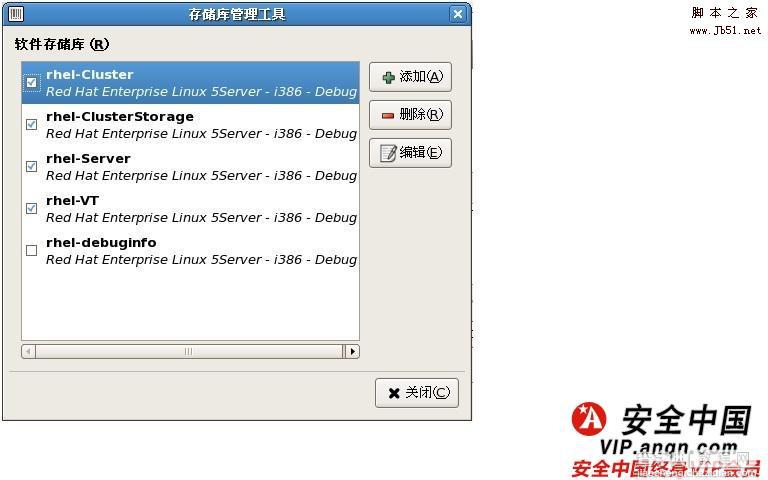Yum可以从众多软件包仓库中搜索软件的依赖关系,因此可以减少由于依赖关系带来的问题。还有就是我们在使用图形界面时,在应用程序-添加删除软件下的浏览里是空的。如下图:

第一种方法:(推荐) 第一步:新建一个文件夹,并把光盘内的所有文件复制到这个文件夹里: [root@localhost ~]# mkdir /yum [root@localhost ~]# cp -rvf /misc/cd/* /yum 第二步:备份repodata文件。因为有四个文件夹里都有这个文件,所以都要备份。 [root@localhost ~]# mv /yum/Server/repodata /yum/Server/repodata.bak [root@localhost ~]# mv /yum/VT/repodata /yum/VT/repodata.bak [root@localhost ~]# mv /yum/Cluster/repodata /yum/Cluster/repodata.bak [root@localhost ~]# mv /yum/ClusterStorage/repodata /yum/ClusterStorage/repodata.bak 第三步:安装工具包: [root@localhost ~]# rpm -ivh /yum/Server/createrepo-0.4.11-3.el5.noarch.rpm 第四步:生成仓库数据库: [root@localhost ~]# createrepo -g /yum/Server/repodata.bak/comps-rhel5-server-core.xml /yum/Server/ [root@localhost ~]# createrepo -g /yum/VT/repodata.bak/comps-rhel5-vt.xml /yum/VT/ [root@localhost ~]# createrepo -g /yum/Cluster/repodata.bak/ /yum/Cluster [root@localhost ~]# createrepo -g /yum/ClusterStorage/repodata.bak/comps-rhel5-cluster-st.xml /yum/ClusterStorage/ 第五步:查看仓库数据文件: [root@localhost ~]# ls /yum/Server/repodata/ comps-rhel5-server-core.xml//这个文件软件包组的分类。 filelists.xml.gzother.xml.gzprimary.xml.gz//这三个文件为软件包列表文件。 repomd.xml //这个文件为MD5校验信息。 在/yum/VT /yum/Cluster /yum/ClusterStorage下面都有这几个文件,作用和这一样。如果想更新软件包,只需把下载完的软件包放在Server或者其他三个目录里,再使用第四步重新生成数据库文件即可。 第六步:客户端配置:主要修改下面红色的部分: [root@localhost ~]# cp /etc/yum.repos.d/rhel-debuginfo.repo /etc/yum.repos.d/chenbin.repo [root@localhost ~]# vi /etc/yum.repos.d/chenbin.repo [rhel-Server] name=Red Hat Enterprise Linux $releasever - $basearch - Debug baseurl=file:///yum/Server enabled=1 gpgcheck=1 gpgkey=file:///etc/pki/rpm-gpg/RPM-GPG-KEY-redhat-release [rhel-VT] name=Red Hat Enterprise Linux $releasever - $basearch - Debug baseurl=file:///yum/VT enabled=1 gpgcheck=1 gpgkey=file:///etc/pki/rpm-gpg/RPM-GPG-KEY-redhat-release [rhel-Cluster] name=Red Hat Enterprise Linux $releasever - $basearch - Debug baseurl=file:///yum/Cluster enabled=1 gpgcheck=1 gpgkey=file:///etc/pki/rpm-gpg/RPM-GPG-KEY-redhat-release [rhel-ClusterStorage] name=Red Hat Enterprise Linux $releasever - $basearch - Debug baseurl=file:///yum/ClusterStorage enabled=1 gpgcheck=1 gpgkey=file:///etc/pki/rpm-gpg/RPM-GPG-KEY-redhat-release 第七步:查看:如图,已经出现软件列表了。

如果在上图中的编辑里选择软件存储库,就出现下图:

如果把这里的勾去掉,再次打开就没有软件列表了,同时在/etc/yum.repos.d/chenbin.repo配置文件下的enabled=0。 清除一下yum安装时的缓存: [root@localhost ~]# yum clean all 安装一个软件试试: [root@localhost ~]# rpm -ivh /yum/Server/httpd-2.2.3-22.el5.i386.rpm warning: /yum/Server/httpd-2.2.3-22.el5.i386.rpm: Header V3 DSA signature: NOKEY, key ID 37017186 error: Failed dependencies: libapr-1.so.0 is needed by httpd-2.2.3-22.el5.i386 libaprutil-1.so.0 is needed by httpd-2.2.3-22.el5.i386 因为依赖关系,所以不能安装。用如下命令安装: [root@localhost ~]# yum install /yum/Server/httpd-2.2.3-22.el5.i386.rpm 系统会自动安装完成。Yum缷载如下: [root@localhost ~]# yum remove httpd。 1.2第二种方法: 第一步:同上,创建一个新文件夹,并把光盘的内容全部复制到该文件夹内: [root@localhost ~]# mkdir /yum [root@localhost ~]# cp -rvf /misc/cd/* /yum 第二步:安装工具包: [root@localhost ~]# rpm -ivh /yum/Server/createrepo-0.4.11-3.el5.noarch.rpm 第三步:生成仓库数据库: [root@localhost ~]# cd /yum [root@localhost yum]# createrepo . //注意后面的. 第四步:查看文件:文件作用同上: [root@localhost yum]# ls /yum/repodata/ filelists.xml.gzother.xml.gzprimary.xml.gzrepomd.xml 第五步:客户端配置: [root@localhost ~]# cp /etc/yum.repos.d/rhel-debuginfo.repo /etc/yum.repos.d/chenbin.repo [root@localhost ~]# vi /etc/yum.repos.d/chenbin.repo [rhel-chenbin] name=Red Hat Enterprise Linux $releasever - $basearch - Debug baseurl=file:///yum/ enabled=1 gpgcheck=1 gpgkey=file:///etc/pki/rpm-gpg/RPM-GPG-KEY-redhat-release 清除yum安装时的缓存: [root@localhost ~]# yum clean all 至此,yum安装完成,但使用这种方法安装后在应用程序-添加删除软件的列表是空的,但使用yum安装软件是可以的。 [root@localhost ~]# yum install /yum/Server/httpd-2.2.3-22.el5.i386.rpm [root@localhost ~]# yum remove httpd 1.3第三种方法: 首先把光盘放入光驱内: 然后复制配置文件: [root@localhost ~]# cp /etc/yum.repos.d/rhel-debuginfo.repo /etc/yum.repos.d/chenbin.repo 最后编辑配置文件: [root@localhost ~]# vi /etc/yum.repos.d/chenbin.repo [rhel-Server] name=Red Hat Enterprise Linux $releasever - $basearch - Debug baseurl=file:///misc/cd/Server enabled=1 gpgcheck=1 gpgkey=file:///etc/pki/rpm-gpg/RPM-GPG-KEY-redhat-release [rhel-VT] name=Red Hat Enterprise Linux $releasever - $basearch - Debug baseurl=file:///misc/cd/VT enabled=1 gpgcheck=1 gpgkey=file:///etc/pki/rpm-gpg/RPM-GPG-KEY-redhat-release [rhel-Cluster] name=Red Hat Enterprise Linux $releasever - $basearch - Debug baseurl=file:///misc/cd/Cluster enabled=1 gpgcheck=1 gpgkey=file:///etc/pki/rpm-gpg/RPM-GPG-KEY-redhat-release [rhel-ClusterStorage] name=Red Hat Enterprise Linux $releasever - $basearch - Debug baseurl=file:///misc/cd/ClusterStorage enabled=1 gpgcheck=1 gpgkey=file:///etc/pki/rpm-gpg/RPM-GPG-KEY-redhat-release 清除缓存: [root@localhost ~]# yum clean all 这种方法安装后在应用程序-添加删除软件里也有列表。同样可以使用yum安装缷载 [root@localhost ~]# yum install /misc/cd/Server/httpd-2.2.3-22.el5.i386.rpm [root@localhost ~]# yum remove httpd 如果把光盘拿出后,在应用程序-添加删除软件就没有列表了,只要放入光盘就有。 1.4总结:YUM常用命令: 1.安装软件包: yum install package yum localinstall package 从本机目录安装软件包 yum groupinstall group 安装某个组件的全部软件包 2.更新软件包: yum update package yum check-update 列出所有可更新的软件包 yum list updates mysql* 查找mysql的更新 yum update 更新所有可更新的软件包 yum update mysql* 更新所有mysql的软件包 yum groupupdate group 更新某个组件的所有软件包 yum list 列出所有已安装和仓库中可用的软件包 yum list available 列出仓库中所有可用的软件包 yum list updates 列出仓库中比当前系统更新的软件包 yum list installed 列出已安装的软件包 yum list recent 列出新加入仓库的软件包 yum info 查询软件包信息 3.删除软件包: yum remove package yum groupremove group 删除某个组件的全部软件包 4.清除软件包 yum clean packages 清除遗留在缓存里的包文件 yum clean metadata 清除遗留在缓存里的元数据 yum clean headers 清除遗留在缓存里的头文件 yum clean all 清除包文件,元数据,头文件 5.搜索软件包: yum search package yum info package 查找一个软件包的信息 yum list package 列出包含指定信息的软件包 yum list installed 列出已安装的软件包 yum list extras 列出不是通过软件仓库安装的软件包 yum list *ttp* 列出标题包含ttp的软件包 yum list updates 列出可以更新的软件包 6.查找特定文件是由什么软件包提供的: yum whatprovides filename 例子: yum whatprovides httpd.conf 可用选项 –disalberepo=lib 禁用某个软件仓库 –enalberepo=lib 启用某个软件仓库 -C 禁用使用本机缓存的元数据 例子: yum –disalberepo=livna|–enalberepo=livna install mplayer yum -C info httpd


